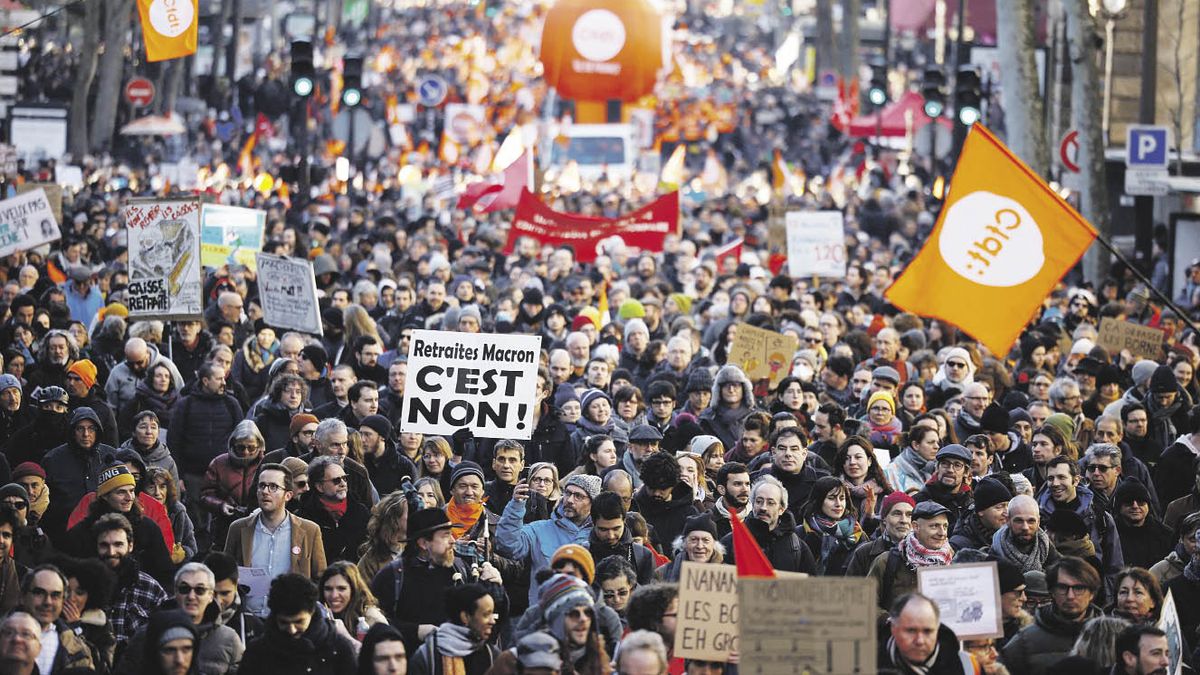Two out of three French people, according to polls, oppose the delay of the retirement age from 62 to 64 by 2030 and the increase by 2027 from 42 to 43 years of the contribution time necessary to collect a full pension, as proposed by the liberal government.
Backed by this rejection, the unions waged an offensive with strikes and peaceful protests that on January 31 resulted in the largest demonstration against a social reform in three decades, in which between 1.27 and 2.8 million people participated. according to the official estimates and those of the organizers, respectively.
But, despite the strong rejection, the Government maintains its plan, which in its opinion seeks to avoid a deficit of 14.6 billion dollars in the pension fund by 2030 and thus align with what is in force in other European countries.
Scenery
For now, the relationship of parliamentary forces favors the president. On Monday, in the first day of plenary debate in the National Assembly (lower house), 292 deputies voted against and 243 in favor of a motion from the left that called for the withdrawal of the plan. The Government chose, however, a parliamentary procedure that limits the time for debate in the two chambers of Parliament and allows it to apply its plan, if they have not ruled by March 26.
“Inactivity is not allowed,” stressed the Minister of Labor, Olivier Dussopt, who defends the reform, although “open to improvements.” Thus, the prospect of a hardening of the protests grows. “If we want the government to give in, the only way is to block the country, transport, energy, youth,” said Arnaud Rougier, a 55-year-old protester in Toulouse (south).
For Laurent Berger, leader of the main union, the reformist CFDT -traditionally a supporter of dialogue-, the government would commit “democratic madness” if it did not listen to the majority’s rejection.
Balance
The success of the mobilization is in the demonstrations. Authorities estimated that yesterday’s marches brought together between 900,000 and 1.1 million people. The Government deployed 11,000 police and gendarmes in anticipation of incidents.
For their part, the strikes, which mainly affected the transport, education and energy sectors, have failed to paralyze the French economy.
The train service and public transport in Paris were again “disturbed” yesterday, although less than on previous occasions, and one flight in five was canceled at Orly airport in Paris.
The CGT claimed a drop of 4,500 MW in energy production, equivalent to more than four nuclear reactors, due to the strikes in this sector, as well as a 75% and 100% strike at the Total Energies refineries (56% according to the address).
Although the reform is an electoral promise of Macron, observers estimate that his re-election in 2022 was due in large part to the desire of voters to avoid the victory of his rival in the second round, the far-right Marine Le Pen.
Weeks later, the ruling party lost its absolute majority in the Assembly. Now he awaits the support of the right-wing opposition, Los Republicanos (LR) – favorable to the reform but with some changes –, given the refusal of the forces of Le Pen and the left.
Source: Ambito




